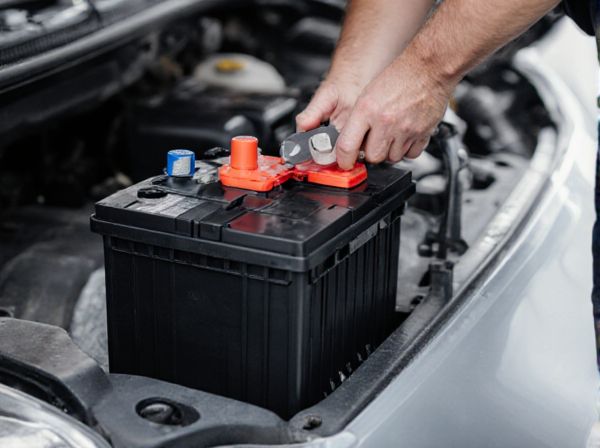
Photo illustration: Low Maintenance vs Maintenance Free
Low maintenance products require occasional care and upkeep to ensure optimal performance and longevity, making them a practical choice for those who prefer minimal effort but still want to maintain quality. Maintenance free items are designed to operate without any regular intervention, providing a hassle-free experience that saves you time and effort. Understanding the difference helps you choose the best option based on your lifestyle and commitment to upkeep.
Table of Comparison
| Feature | Low Maintenance Battery | Maintenance Free Battery |
|---|---|---|
| Lifespan | 3-5 years | 4-6 years |
| Water Refill | Required periodically | Not required |
| Cost | Lower initial cost | Higher initial cost |
| Durability | Moderate resistance to vibration | High resistance to vibration and corrosion |
| Performance | Reliable but needs regular checks | Consistent, minimal maintenance |
| Usage | Best for budget-conscious users | Ideal for long-term, hassle-free use |
Understanding Low Maintenance vs Maintenance Free
Low maintenance refers to products or systems designed to require minimal upkeep, meaning occasional checks and minor repairs to maintain functionality. Maintenance free implies items that need no regular care or servicing throughout their lifespan, often achieved through durable materials or self-sustaining features. Understanding the distinction helps consumers and businesses choose solutions based on the level of effort and cost they are willing to invest in upkeep.
Defining Low Maintenance Solutions
Low maintenance solutions refer to products or systems designed to require minimal regular upkeep while still necessitating occasional inspections or minor servicing to ensure optimal functionality. These solutions balance durability with cost-effectiveness by reducing the frequency and complexity of maintenance tasks. Low maintenance options often include features like corrosion-resistant materials, self-cleaning surfaces, or easily replaceable components, distinguishing them from maintenance-free alternatives that theoretically require no upkeep.
What Does "Maintenance Free" Really Mean?
Maintenance free" refers to products or systems designed to require little to no regular upkeep, minimizing time and effort for the user. It often implies the use of durable materials and technologies such as sealed batteries, corrosion-resistant coatings, or self-cleaning surfaces that reduce wear and tear. True maintenance-free items still benefit from occasional inspections to ensure optimal performance and longevity.
Key Differences Between Low Maintenance and Maintenance Free
Low maintenance products require occasional care such as cleaning and minor repairs, while maintenance free items are designed to function without any upkeep throughout their lifespan. Key differences include durability, cost, and material composition, where maintenance free options often use advanced materials like composite or sealed components to eliminate servicing needs. Choosing between low maintenance and maintenance free depends on balancing initial investment against long-term convenience and performance expectations.
Pros and Cons of Low Maintenance Options
Low maintenance options offer the advantage of reduced time and effort for upkeep, making them ideal for busy homeowners and businesses seeking efficiency. These options often require occasional cleaning and minor repairs, which can be more cost-effective upfront compared to fully maintenance-free alternatives. However, the potential downside includes periodic maintenance tasks that might still incur some time and financial investment over the product's lifespan.
Advantages and Disadvantages of Maintenance Free Products
Maintenance-free products offer significant time and cost savings by eliminating the need for regular upkeep, making them ideal for busy lifestyles and reducing long-term operational expenses. These products often use durable materials like galvanized steel or composite components, enhancing longevity and resistance to wear and environmental factors. However, initial costs can be higher compared to low-maintenance alternatives, and limited repair options might lead to complete replacement rather than fixes if damage occurs.
Cost Comparison: Long-Term vs Upfront Investment
Low maintenance materials typically require a lower upfront investment but may incur higher long-term costs due to repairs and upkeep. Maintenance-free options often come with a higher initial price but minimize expenses over time by eliminating routine servicing needs. Evaluating the total cost of ownership reveals that maintenance-free solutions can offer significant savings and enhanced durability throughout the product lifecycle.
Common Myths About Maintenance Requirements
Low maintenance often implies occasional upkeep such as cleaning or minor repairs, whereas maintenance free suggests little to no intervention is necessary. Common myths include the belief that maintenance free products require zero care, but in reality, they still need periodic inspections to ensure longevity and performance. Understanding these nuances helps consumers make informed choices based on realistic expectations of durability and upkeep.
Choosing the Right Option for Your Lifestyle
Choosing between low maintenance and maintenance-free options depends heavily on your daily routine and time availability. Low maintenance solutions typically require occasional upkeep, offering a balance between effort and longevity, ideal for moderately busy lifestyles. Maintenance-free choices minimize ongoing care, making them perfect for individuals seeking convenience and consistent results without regular intervention.
Final Verdict: Which is Better for You?
Choosing between low maintenance and maintenance-free materials depends on your lifestyle, budget, and the specific application. Low maintenance options require occasional upkeep to preserve appearance and functionality, offering a balance between cost and effort. Maintenance-free products provide long-term convenience and durability with minimal intervention, ideal for those seeking hassle-free solutions and long-lasting results.
 caratoz.com
caratoz.com